
Discover the Top End of Australia - Scenic
routes and major tourist destinations from Darwin to Kakadu and
beyond in Northern Territory, Australia
Top End of Australia - A top 5 Australian tourist destination
| A must see when holiday in Australia
| Kakadu
National Park | Litchfield
National Park | Nitmiluk
National Park | Arnhem
Land |
![]()
Glossary of Australian travel terms and words
Specials: This is generally speaking a package or tour with a set time to pay and to travel by that has been discounted.
Transfers: Usually this means the mode of transport from your hotel to the tour starting point or finishing or airport. Not generally used in our tours. Except might be used when you fly into Seven Spirit Bay or Bathurst Island tours.
Force Majeure: From the French, literally a stronger force. In the context of a tour operator's responsibility clause, referring to something beyond one's control, as in an act of God. Reference 'Group Travel' Author Martha Sarbey de Souto.
Independent Australia Vacations: On our classes in our sites the following applies - When you as a single adult or couple or family travelling and the tour is sectionalized to a area say as Darwin to Alice Springs 5 day's including Uluru. Let's say your trip, your holiday, your vacation is 30 day's then this tour is just one independent tour within that 30 day's. Other classes of a vacation may include the flights say from USA to Australia return with built-in 5 individual touring components and transfers and all accommodation catering for every day of the 30 day's vacation in Australia.
What is a escorted Australia tour in Australia? An escorted Australia tour usually appoints and has a tour director on board and at your accommodations (unlike a an independent vacation). Though some vacation packages include the services of a local host such as home stay or national park guide or local icon destination authority in select cities and destinations.
A tour director has many tasks and roles though can also offer advice on travel of that tour, can recommend restaurants, suggest optional sightseeing activities and help with your schedule for any external excursions.
The Selfdrive Glossary We Use:
4WD Hire: Generally a large current model standard Toyota Land Cruiser Station Wagon or similar Nissan. An example of a operators 4WD clause would be as follows: Four Wheel Drive Vehicles can also be driven on recognized gazetted unsealed tracks but may only travel to the following remote areas with the express written permission of Apollo: Any Islands, Tasmania, Simpson Desert, Gunbarrel Highway, Cape York (North of Daintree River), Oodnadatta Track, Birdsville Track, Tanami Track, Gibb River Road, Kalumburu Road, Warburton Road, Strzelecki Track, Cape Leveque, Bungle Bungles and any other remote area. No Vehicle is permitted on the last 2 kilometres of the Lennard River Gorge Road, the Canning Stock-route, The Lost City in Litchfield Park and the Telegraph Road section of the road to Cape York.
4WD Camper: A 4WD campervan is a 4 Wheel Drive vehicle with a rear cabin for sleeping and sometimes a dining and meals preparation area. There is also a storage area for personal belongings, stoves and fridges.
Camper: A 2WD campervan is a 2 Wheel Drive vehicle with a rear cabin for sleeping and sometimes a dining and meals preparation area. There is also a storage area for personal belongings, stoves and fridges.
Campervan: A campervan is a self-propelled vehicle that provides both transport and sleeping accommodation. The term mainly describes vans that have been fitted out for use as accommodation. They are considered as an alternative to the purpose-built recreational vehicle or motorhome because they are smaller and handle like most vans. Reference- en.wikipedia.org/wiki/Campervan
Motorhome: Generally a luxurious long body vehicle with over a 2 Metre height factor and is a Two Wheel Drive Vehicle that can only be driven on sealed/bitumen roads or well maintained access roads less than 5 kilometres long to recognised campgrounds. Motorhomes accommodated from 1-6 people with generous room to move around and has mains 240V air conditioners but the amp is 15amps not to be plugged into a normal wall socket more for tourist parks and proper campgrounds which are fitted with 3 phase in Australia, also compact toilet and shower.
RV: Recreational vehicle is a vehicle used for the personal pleasure of selfdrive travel- we tend to use this in the same reference as the motorhome.
Hire + Rentals: Both words actually mean different things in the dictionary though in the selfdrive industry we generally recognise them as the same meaning. That is to engage in a rental contract in hiring a vehicle the hirer will drive themselves from agreed start and finish location with agreement in writing to the suppliers Terms and Conditions.
Selfdrive: A vehicle 2WD or 4WD that the driver is the traveller.
People's Choice Questions - Tour versus Safaris
What is the difference between a tour and a safari?
In Australia especially in Northern Territory the two words 'tour and 'safari' can often be used together. Traditionally a safari is a African Swahili word safari indicating "long journey", previously used when hunting. A guided safari now days as in Australia is for travelling vast distances to observe, photograph and experience close up and in person animals, all other wildlife, natural habitats, national parks, pristine nature spots such as waterfalls and flora and fauna unique to that area.
What is an Australia guided tour?
Whereas an Australian guided 'tour' (being a noun) is traditionally a journey for pleasure in which several different places are visited such as the Great Ocean Road in Victoria and then onto the Great Barrier Reef near Cairns in Queensland. If the trip is from Sydney to Darwin and include Ayers Rock Uluru and Kakadu then it may be called a safari tour. A tour can include a spectrum of sites, places, travel styles and activities.
What is an Australia adventure safari?
An adventure safari tour is one generally for fit and adventurous persons usually over 8 years old and under 65 though we have helped many folks in their 70's and even 80's or with young families under 8 years old on selected tours and private customized charters who have been very fit and adventurous persons.
Can singles, couples, families or groups join Australia adventure safaris?
Some people like to travel only with same age adventure travels so tours are especially designed for certain age groups such as over 40's adventure tours or 18-35's adventure tours. All these adventure tours found here are for singles, couples, friends or small groups of friends and we call this DYI adventure tours.
People's Choice Questions - What do I ask for when I email you for advice or a quote
Email us for a free quote: Try our free secure quote form:
To offer a quote we need the following:
Ref: Tour code i.e. NTK2 - if you know it.
Full Name of main enquirer i.e. Jill Chang
Start Tour Dates i.e. 21 June 2013
No. of People i.e. 3 pax: Age 8+32+86
Contact Tel Number Aust or O/S i.e. Aust 08 7999 7511
Any flexibility in your travel dates i.e. 3 day's start of tour
Ages of children under 18 i.e. 12
Fitness: if you say 1 boot = soft adventure overnight Uluru
for example and day tours 2 boots = 2-6 klm in walks of say
1-2-3 klm per walk and say 2-3 walks per day and climbing over
uneven which is sometimes slippery terrain to get to a scenic
spot such as a waterfall in Kakadu. 3 Boots = 9+ klm in walks
of say 2-4 klm per walk and say 2-3 walks per day and climbing
over uneven which is sometimes slippery terrain to get to a scenic
spot such as a waterfall in the Kimberley.
Other Information i.e. Please any special health or food you have.
Also any must do bucket list spots to see.
General classifications we tend to use that sometimes overlap due to the large number of suppliers we have listed.
Backpacker Tours: Generally indicates a small group tour using basic camping, bush camping, semi or permanent camping or multi share dorm accommodation. Vehicles used are usually either troop Carriers or 21-24 Seat Mini-Coach in 2wd drive vehicles. These tours have a loosely based itinerary which will vary from guide to guide and access to the attractions may be seasonal. Generally speaking people 18-35 on a tight budget prefer these types of tours.
'Safari in Style': Safari accommodation (large permanent twin share tents) with proper beds, pillow, linen, towels, fans and lighting. Campsites have permanent cooking facilities, screened eating areas, share showers & toilets.
Luxury Campsite/Deluxe Campsite: Generally purpose-built "Safari Tents". They are locally designed for our tropical climate. The walls are of canvas and the windows of insect screen. The floors are wood and are raised above the ground. They have been specifically designed to keep cool and comfortable. A tent has two standard size single beds, each with a traditional Australian bushman's swag and high density mattress, linen, blankets and pillow.
Australian Safaris: See above main category.
Safari and meaning of the word in a traditional sense: A safari (from Swahili word meaning a long journey or trip) is an overland journey. now days, it's often used to describe tours through national parks to watch Wildlife (fauna),flora and geological formations.. Reference: en.wikipedia.org/wiki/Safari_(travel)
Australian Overnight Tours: A tour starting early morning or midday on day one and finishing midday or early evening day two.
Australian Extended Tours: We class this as a tour over 10 day's generally combining more than one tour and often one way such as Darwin to Alice Springs and include highlights such as Uluru and Kakadu.
Australian Returning Tour: This is a tour that say may start from Darwin and returns to Darwin when it has finished.
Australian one way Tour: This is a tour that say may start from Melbourne and finishes at a different city such as Darwin.
Australian Cultural Tours: This is a tour that experiences true Aboriginal Culture sometimes in the Aboriginal Communities such as Tiwi Islands off Darwin or other times at natural wonder such as Uluru at Anangu Waai Tours at Uluru.
Australian Moderate or Soft Adventure Activities: 4WD Adventures, Bush Walking - See above main category.
Australian Adrenalin Adventure Activities: Examples we class -4WDing, ATV Quad Bike, Ballooning, Trekking, Extended Camel Riding, Camping, Horse Riding, Jetski, Kayaking, Scuba Diving, Snorkelling, Skydiving, White Water Rafting.
Australian Sightseeing: One day coach trips to say The Blue Mountains, The Great ocean Road, National Parks, or Scenic Flights, one day diving, one day sailing, one day cruises.
Australian Event Touring: Tours to a specific event such as the Tamworth Music Festival, Mt Isa Rodeo or Birdsville Races.
Tours Glossary We Use: Sometimes what we say will vary to a term you may recognise. Please note these are terms we use or recognise in our sites and may differ to other specialists and operators.
Tour: Any pre-arranged, prepaid journey to one or more destinations and returning to the point of departure. Usually includes transportation, accommodation, meals, sightseeing, and other components, and is sold as a unit without price break-outs by component. Reference 'Group Travel' Author Martha Sarbey de Souto. Also 'tour' maybe regarded as a regularly scheduled guided group visiting one or more destinations and seeing natural and cultural places of interest along the way. This journey may be a returning or one way tour.
Extended Touring: We class this as a tour app. over 10 day's generally combining more than one tour in a one way direction. We class this as a tour over 10 day's generally combining more than one tour and often one way such as Darwin to Alice Springs and include highlights such as Uluru and Kakadu.
Returning Tour: This is a tour that say may start from Darwin and returns to Darwin when it has finished.
one way Tour: This is a tour that say may start from Melbourne and finishes at a different city such as Darwin.
Trip: Is a journey from start to finish.
Travel: Is how you make your way around on the journey from start to finish you taking on your holiday.
Charter: To hire by contract the entire capacity of a motorcoach with the driver/guide basing a trip plan on the needs and desire.
Personalised Tour: Again the same as to hire by contract the
entire capacity of a motorcoach with the driver/guide.
Tour Operator: This is a tour company that you travel with on tour. A tour operator is the person who supplies the guide/host/driver, the vehicle, the back-up support, the camping equipment, the accommodation arrangements, and the food.
Our E-ticket: A electronic ticket via email consisting of 3 pages. The first is for you to sign and return to us via fax or scanning confirming your ticket details. Pages 2-3 you take with you and hand to the driver at pickup.
Our Quote: An email sent by us usually around 2-3 pages details a specific tour.
F.I.T: (foreign independent Traveller) - An international pre-planned, pre-booked, and prepaid trip with an itinerary and components planned to the traveller's specifications. Custom-designed itinerary, as opposed to buying an existing travel package. Reference 'Group Travel' Author Martha Sarbey de Souto.
Adult Prices: This is usually for a person aged 12/14/16 and over in Australian land based tours. Your quote will specify the exact age for child or adult pricing. The age will vary between tour operators.
Childs Prices: Generally children between 4-12 up to 16 depending on the particular tour operator. Your quote will specify the exact age for child or adult pricing. An example is her from the operator ' Adventure Tours Australia'. Children over 12 years of age pay full adult fare. * Children aged 8-12 years receive a discount on most tours. Prices available on application. * Children under 16 years of age are not permitted to unless accompanied by an adult. It can differ between tour companies.
Infant: Generally a child under 2 years old. It can differ between tour companies.
Adventure Traveller: Trips and tours designed for the active traveller often including hiking to see a remote icon scenic spot or flora and fauna, hiking, destination swimming i.e. from the bank of a gorge to the bottom of a waterfall, trekking, rafting, camping, terrain exploring. For the fit and adventurous who want to get off the beaten track.
Soft Traveller: Those who prefer the more comfortable facilities yet still travelling to experience all Australia has to offer and can hike 2-4kms a day over uneven terrain often in high temperatures.
Extreme Adventurer 3 Boots or 3 Boots+: Hikes up to 9kms or more per day. Warning: Tours graded with 3 Boots are only suitable for very fit people who enjoy basic bush camping and can hike 5-9kms a day over uneven terrain often in high temperatures.
Bus: Generally a 45-52 front facing seat coach - vehicle with air-conditioning. Some have toilet often for 3-10 day's trips they don't here.
Mini Coach: Generally a 21-24 front facing seat Toyota vehicle with 'NO' toilet on board
Coach: Is a motorcoach or deluxe bus with a toilet on board. Generally a 45 front facing seat vehicle with air-conditioning.
Troopie: This is referred to a Toyota Troop Carrier. With 3 seats including the drivers in the front and 2 side facing cushioned bench seats (4 pax) on each side in the back. Please not the vehicles are air-conditioned though often we find guides like to drive with the window's down as the tour passengers and jumping in and out of the vehicle so often the guides want the passengers to get acclimatised to the area. Generally last day on the way home the a-c goes on.
Fly net: A net pulled down over ones face to protect themselves from annoying flies. Mostly used seasonally in Central Australia. Cost App $8.
Depart: This is usually a 5.30 -7am start from a city. In our tickets and quotes we will clarify this.
Pickup: The address of where you begin the tour.
Finish: This is usually at the end of the tour. Finishes times are generally 5-8pm unless specified in your quote. Exception would be some of our Ayers Rock tours which finish at midday at the rock..
Deluxe tour: A term that varies between tour operators. We generally say this to be the best of the tours that particular tour operator has to offer. This will either have accommodation or best quality campsites.
Luxury tour: As with Deluxe tours this is the same. A term that varies between tour operators. We generally say this to be the best of the tours that particular tour operator has to offer. This will either have accommodation or best quality campsites.
Luxury camping: A term that varies between tour operators. We generally say this to be the best camping facilities of the tours that particular tour operator has to offer. This will have campsites with hosts and cooks. The meals will be not be fine dining but better quality than basic camping. The tents will be slightly bigger with beds frames, pillows, mattresses and linen. Some will have lights and fans.
Bush camping: Generally - no facilities other than those that are carried on the vehicle. Passengers sleep in swags (Aussie bedroll). The tour will stop along the way at roadhouses for clients to have a shower etc. or swim in waterholes and gorges.
Permanent camping: Generally - have permanently erected tents (multi-share), permanent cooking facilities and purpose-built fire pits, screened eating areas, share showers and toilets.
Semi permanent camping: Generally - tents must be erected by guide and passengers, share showers and toilets, no cooking facilities except those carried on the vehicle.
Basic camping: Generally - tents must be erected by guide and passengers, share showers/toilets or some/all nights no showers/toilets, no cooking facilities except those carried on the vehicle. (Specified in the itinerary section of your quote what's available- if not please ask us). As tour companies may tend to move campsites these facilities change.
Safari in Style/Deluxe Campsite - Safari Accommodation (large permanent twin share tents) with proper beds, pillows, linen, towels, fans and lighting. Campsites have permanent cooking facilities, screened eating areas, share showers and toilets.
Pax: Generally one person who is on a tour. Passengers
Per Person: Generally the price of a single adult or child
Small Groups: We usually say this for number from 5-24 passengers
Medium Groups: We usually say this for numbers from 30-52 passengers in a tour.
Large Groups: We usually say this for numbers from 53+ passengers in a tour.
Guide: Person licensed (wherein necessary) and employed to take tourists on local or interstate sightseeing and adventure excursions. Not to be confused with the host. Usually also your driver on a tour. This person will accompany you on the itinerary walks and explain about the local flora, Fauna and cultural aspects of that area. The guide may not be a walking dictionary though he generally will have a sound knowledge of the area.
Host: The person accompanying the guide or driver. This person is licensed (wherein necessary) and employed to generally be known as the tour groups manager and explain the sights. We find this term 'Host' seems to vary between companies.
Driver: Is usually your guide. The drivers responsibility is for the driving of the tour clientele throughout the tour. He is generally responsible for the maintenance whilst on tour.
Breakdowns: This is when a tour vehicle breaks down during a tour. A driver must follow protocol and his operations managers guidelines. Often that may be to delay the trip and wait for a replacement bus or spare part or service mechanic. Even a new bus can develop difficulties. The more remote the trip usually longer the wait. As vehicles are service regularly this is not a common occurrence. The Australian Tourism industry prides itself on providing reliable vehicles.
Sightseeing: Generally a term we use for a very soft adventurer or large coach group on tour. This we feel means guided tours of sights easily accessed. We acknowledge this term can be described in many ways. We don't strictly adhere to this definition.
Admission fees: includes fees to National Parks, Museums, Cultural Centres and attractions.
Hostel accommodation: Ever noticed there is only one letter different between hotel and hostel. - 4 or 6 or 12 bed Dorm rooms or Twin/Double rooms with shared facilities. Shared facilities may be a common kitchen, toilets and showers (toilets/showers same sex generally).
Outback Budget accommodation: Generally - Each room is air conditioned and contains bunks or a double bed and bunks, two people in each. There is also table and chairs in the room but no en suite or private facilities. Budget accommodation guests share a shower and toilet block near the rooms. Bed linen and pillows are supplied.
Hotel accommodation: Generally - Hotel/Lodge accommodation is three star in the outback. Each room is large, airy, air conditioned and has private bathroom facilities unless specified.
Waiting List: people on a list for an last minute opening occurs
Cancellations: When a client contacts the agent or operator and say they wish to not go on the tour anymore after they have booked. Tour operator - no one cancellation policy is the same between Tour Operators. A rule of thumb may be - Up to 30 day's - agents deposit credited for another booking. 48 Hours - 30 day's is 25% of Fare Plus Deposit. 24 Hours - 48 Hours - 50% of Fare Plus Deposit. Within 24 Hours or No-Show 100% of Fare Including Plus Deposit
No-Show: If it is departure time and a tour passenger has not arrived, there is no alternative but to go on without the passenger - a no show.
Credit Card Fee: Currently only one tour company has a credit card fee. This is Adventure Tours and they have a 2% fee on all amounts taken by them using a visa or mastercard.
Rack Rate: Published -regular rates of a tourism service.
Gross rate: Rate prior to deducting any commission
Net Rate: Is the rate wholesale rate before any mark-ups. If payment is taken as a spilt system (see payments) then generally speaking in our tickets we will show this as the amount the supplier requires.
Twin Share: All tours with camping or accommodation tend to be twin share or even dorm share. Our tours have this listed. Twin share is when 2 people share a room with two single beds in the one room with shared facilities. Some tours offer optional extra upgrades so a person be accommodated alone.
Single Supplementary Charge: When you have a single adult travelling and the tour is based on twin share. This person then requests if available a single tent or room to themselves paying the difference for upgrading.
Optional Tour: This is where a passenger may choose a option not part of the tour itinerary such as a flight over the Kakadu escarpment or Quad 4WD-ing on a tour from Hobart.
Add-on: A supplementary charge. This is explainedwhen offered in detail.
GST: The Australian Goods and Services Tax. This is 10%
YHA: Youth Hostel Association member
VIP: A Membership of a backpackers Association
Backpacker: It used to be someone with their travel and personal items in a canvas bag strapped onto their back in a knapsack, travelling in a one way direction on a limited budget exploring different nations and cultural as they travelled through that country. Now day's it can include such people as a couple of professionals (with the backpack) on a limited time frame travelling just one country wanting to explore it's icons and highlights with a very generous budget staying in 4 star hotels.
Packaged Tour: Pre-arranged combination of such as hotel, air, sightseeing and social events packaged together and sold as an all-inclusive package.
![]()
-
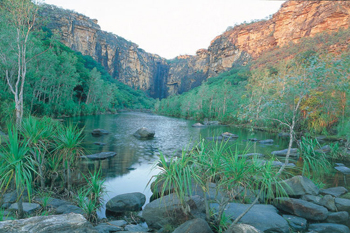
4wd camping tours to Jim Jim Falls Kakadu Australia
Hike and trek the 1 klm path to one of Kakadu's greatest waterfalls in Jim Jim Gorge in Kakadu National Park
-
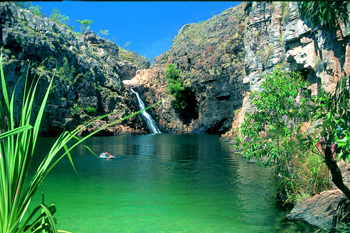
4wd camping tours to Maguk - Barramundi Gorge
Short hike from the 4wd car park to tour Kakadu's pristine all year round creek feed Maguk pool for a swim
-
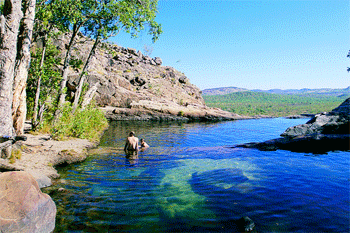
Kakadu 4wd tours to Gunlom Falls and Rock Pool
Gunlom Waterfall tours and Rockpool 4wd access track - explore remote areas of Kakadu and the Top End
-
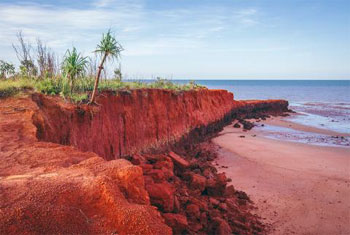
4wd camping tours to Arnhem Land from Darwin
Include majestic Arnhem Land in your next planning for a Kakadu 4wd camping tour in Top End of Australia
-
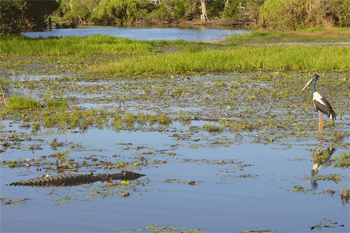
Yellow Waters cruise on Yellow Waters Billabong
Scenic wildlife cruises on a outback billabong. Kakadu 280 different types of birds and 10,000 crocodiles
-
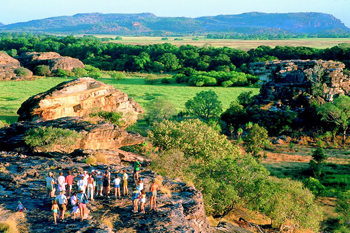
Nourlangie versusUbirr rock art Kakadu
Explore the ancient rock painting art galleries in Kakadu Australia. See first European tall ship drawings
-
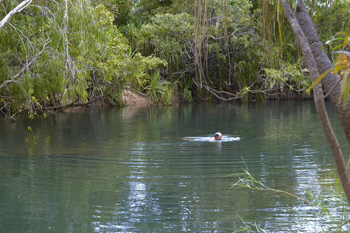
Personalised custom made Kakadu tours
Let us help plan your Kakadu custom made tour include Katherine Gorge and Litchfield National Park
-
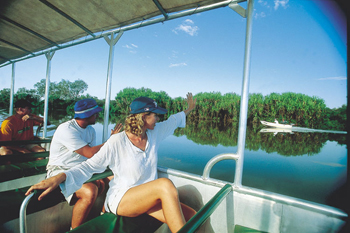
Kakadu 4wd tour with 'The Territory Specialists'
Over 200 Territory tour specials Australia 4 Tours & Uluru Camping Tours with Darwin based experts
-
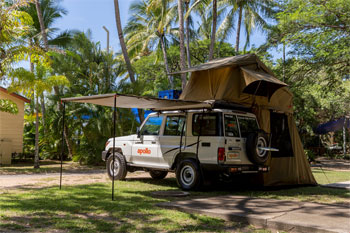
Travel self drive Australia's Kakadu & Top End
Condiser doing it yourself then a 4WD Camper Rentals from Darwin. Travel in a loop return or one way